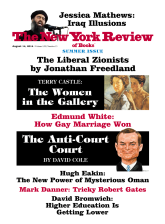In response to:
The Refounding Father from the June 5, 2014 issue
To the Editors:
Cass Sunstein’s review of Justice John Paul Stevens’s Six Amendments: Why We Should Change the Constitution [NYR, June 5] omits what I believe is the greatest danger of amending our charter of liberty, namely, diluting the First Amendment. I have taught and lectured on the First Amendment for many years and have conducted research on whether students and others would protect all speech as the Constitution commands. The language is absolute: government “shall make no law…abridging the freedom of speech.” There is no exception. Yet courts make exceptions based on nothing more than the statement that “it has always been understood” that certain categories of speech are not protected. See Chaplinsky v. New Hampshire (1942).
In questionnaires I have submitted to audiences virtually 100 percent would except some speech and many would simply leave it to a government censor. Nothing could be more devastating to American constitutional liberties. The rare exception to answers to my questionnaire was a ninety-one-year-old woman in a retirement community who answered, “NO EXCEPTIONS!”
None of my students in recent years has protected all speech, and in class discussions the differences in answers have revealed that my students are in their twenties and the last third of their lives has been under George Bush and Guantánamo and Barack Obama’s timid protection of speech while spying on every telephone conversation in the country. Students are accustomed to such devastation to our liberties as “normal” and therefore constitutional.
The logical expectation would be to amend the First Amendment to reflect this consensus. The main reason why this has not yet happened is that it is very difficult to amend the Constitution, as Sunstein observes. But if Justice Stevens’s six amendments are approved, why not add a seventh?
The lesson to be learned is to leave the Constitution alone and hope for better justices to counter the destructive tendencies of the conservative majority on the Court. Once the First Amendment is destroyed, there is little to distinguish the unique American adventure in government from the rest of the world.
Burton Caine
Professor of Law
Temple Law School
Philadelphia, Pennsylvania
Cass R. Sunstein replies:
In warning about the risks of populist movements, Professor Caine modernizes some of Madison’s cautionary notes about constitutional change. The nation’s history shows, however, that it is possible to press for narrow, targeted changes to the founding document, without necessarily putting the rest up for grabs.



